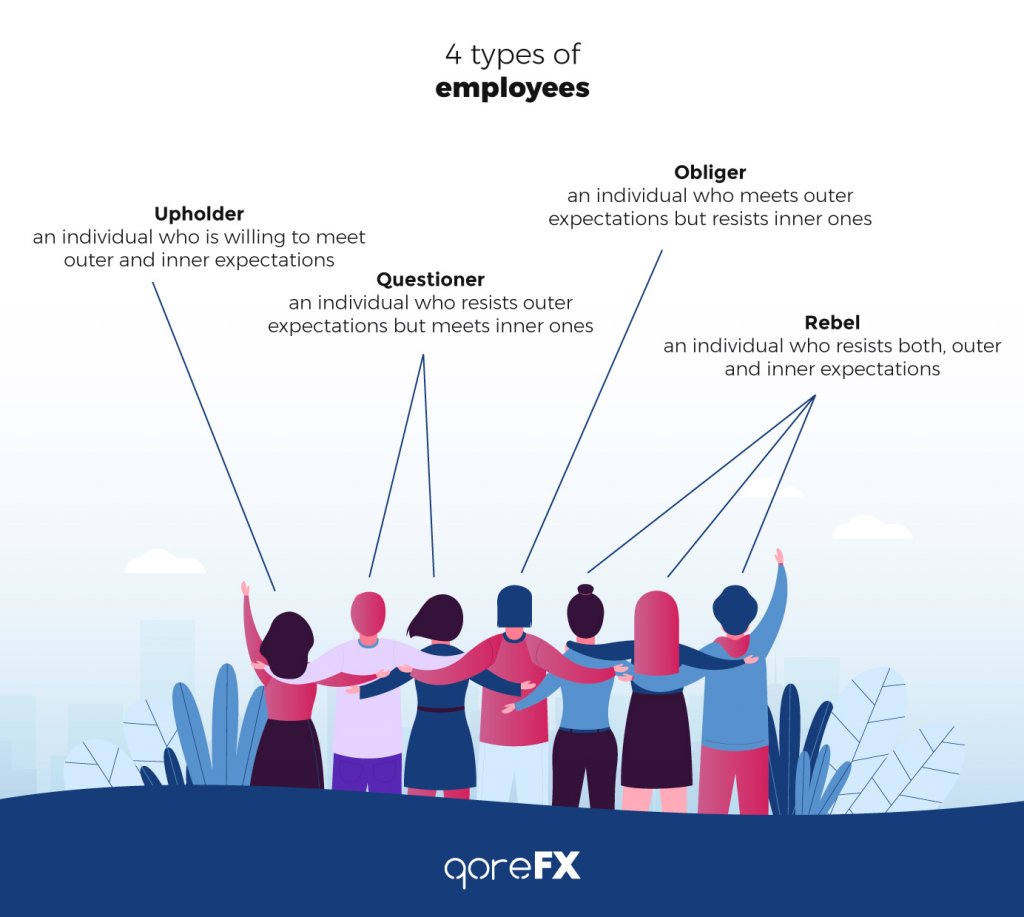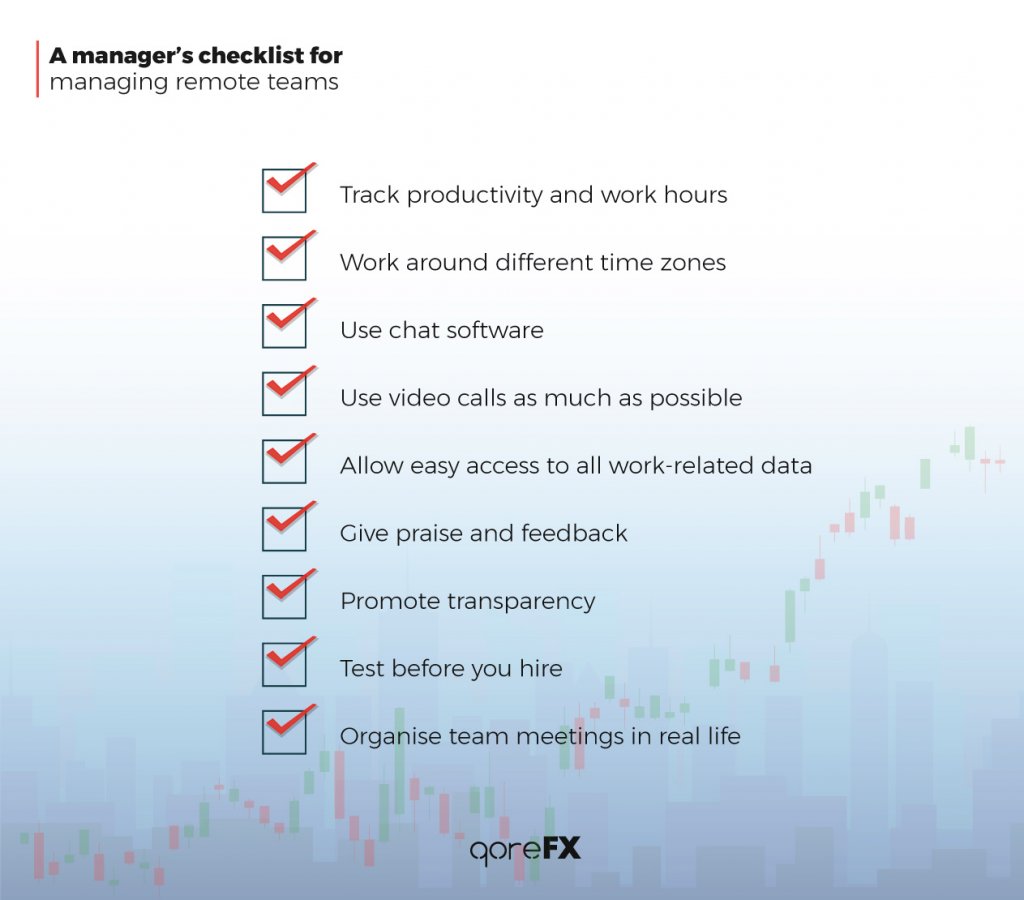
How to successfully build and manage a remote team

With more and more Forex companies looking towards outsourcing, managers are faced with a new challenge – managing a remote team. Even though this has been made easier with the help of technology and high-speed internet, there are still things like motivational tactics, task control and communications that demand a specialised approach.
The benefits of hiring people remotely are endless and allow you to easily stay ahead of your competition. Because your HR isn’t limited to one area and you can hire people from any place in the world, your company can afford to create a talented team of the best specialists in the market. This makes all the challenges faced worth it and is exactly why a remote style of employment will keep on gaining momentum in the future.

The foundation of remote work is quite simple – Output, Independence and Flexibility. They affect the way your team will work, the fluidity of the business processes and the success of the result. And while most people still believe that remote workers aren’t as productive as regular in office ones, the truth is that most remote workers actually see a productivity boost equivalent to a full extra day of work.
So how can you manage a remote team effectively? How can you help it grow and be more engaged and well-coordinated? Below are some tips we have gathered to help you find an answer to these questions.
TIP 1 – Keep the efficiency high
Having your team scattered all over the word can take a toll on productivity, unless certain actions are done to maintain it. In a virtual environment it’s not only hard to tell how much time your employees are spending on tasks and how effective they are, but it’s also important to have a clear understanding how the whole team is coping with the workload.
This is why it is important to implement a very well thought through business process and incorporate the use of a number of software tools. Work time tracking tools like Toggl or Clockify, can really help you to maintain an understanding of what projects are being worked on, how much time is being spent on them and how many breaks were taken, all in real time. This way managers can pin point each worker’s weak points and try to fix them.
This doesn’t mean that you have to overuse these apps and build strict processes accordingly. If people are working remotely, chances are that they chose this because of the flexibility it gives them. Managers need to find a balance between giving their employees some freedom and still setting some consistent time frames.
For example, they need to decide on which communication tools are used in which cases – chat’s for urgent things, email for things that can wait and video calls to discuss matters of very high importance. Next, they need to guarantee full transparency, by making sure that all data on the projects are accessible to each member on the team (tools like Google Drive and DropBox can help with this).
They also need to always remember that remote employees can all be working in different time zones This is why it is important to find a time window when everyone can tune in to a video call. This also means, that when you are hiring people, you need to make sure that the time difference in their location isn’t more than 3 hours from your headquarters’ time zone. Because of time differences, you also always need to have a very clear agenda for each meeting, and you need to stick to it.
Finally, to always have your hand on the pulse, you need to measure output. Try to list all the key points in each team member’s job that show how well it is being performed. Set clear goals with measurable results, so that your employees can have a clear vision of what is expected and how well they answer to these expectations. Hold monthly reviews within the team to see how everyone is collaborating and if everyone is coping well.
Don’t be afraid of giving honest feedback, however, do keep in mind that people almost always focus more on the negative points than on the positive ones. This is why managers need to be honest with their employees and always try to find something positive to say at the end.
TIP 2 – Build strong communication skills
Good communication between team members is important for any team, but it is especially important for remote teams. The lack of physical presence and different work schedules all can lead to your team members working as individuals rather than a united front.
Remote teams have to actually communicate twice if not three times as much as a normal team would. And it is up to the managers to help them create more opportunities for these communications.
Set certain prompters for your team. Tell them to always mark the time spots when they are available for calls in their calendar. Choose the main communication tools and make sure that your team is using them. Implement tools like Slack,WebEx and Skype,and let your team know that these should be open constantly throughout their work hours. Agree on an email response time span so that they know when to expect replies to messages.
Try to incorporate video calls as much as possible. IMCCA discovered that 90% of remote workers feel more connected to their team when they are actively using video conference tools. Video allows your team to put a face to a name, and bond better. It’s always easier to talk to a person when you can see them, rather than through messaging only.
Video calling help your remote team feel move involved and less isolated.
When talking to your team members, share your screen to make explanations easier and more straightforward. Create separate channels in your communication tools to share interesting things unrelated to work, like fun articles, movie recommendations or updates on TV shows you all watch.
Your goal is to build a friendly virtual environment where communication amongst your team will prosper and evolve.
TIP 3 – Motivate, Motivate and Motivate
Motivation is the key component of successful teamwork. According to Entrepreneur, an unmotivated or disengaged workforce costs business $450 to $550 billion in lost productivity each year.
Managers working with remote teams need to invest in them and work extremely hard in boosting their morale each day. Building a strong corporate culture in remote teams is actually even more important than in physical ones.
Start with one of the fundamental aspects of a motivated team – Transparency. You need to make sure that everyone on your team understands exactly what the company does, what its goals are and what their roles are in all of this. Share corporate news and updates, celebrate their individual achievements and try to create a true team feeling amongst them.
Be honest and allow them to get to know you as their leader too. Tell them about yourself and share your personal vision. Describe things that you are currently handling, so they understand that you are working just as hard as they are. Ask for their opinion and advice on different matters.
Be consistent with feedback and be specific with your praise. Don’t just tell them that they are doing a good job, but actually highlight specific achievements and tasks. Try to also praise your remote employees in corporate public chats, so that their achievements are celebrated throughout the company.
Create rituals and traditions within your team. Celebrate your remote employees’ birthdays and special occasions. For example, why not ask each team mate to record a short video with wishes, that you can edit together later and send to your fellow colleague who is celebrating?
Boost camaraderie with actual personal interaction by investing in corporate retreats at least once a year, where your remote team can get together in real life.
Learn more about how to motivate your team here.
TIP 4 – Choose your team wisely

Hiring the right people to work remotely is your half way to success. Everything else evolves around this. Even one lazy or unprofessional remote employee can affect your whole team. This is why it is important to take certain precautions during the hiring process.
First of all, no one says that you have to hire the person full-time from the start. Test their abilities and skills for a few months by hiring them part-time and offer them the chance to work with you long term after you are certain that they would be a good addition to your team.
Don’t be stingy with salaries. Just because your employee is working remotely doesn’t mean that they aren’t doing more than your typical office worker does. In most cases, remote workers are actually doing more, so their salaries have to reflect this.
Make sure that your new remote employees can actually work from home. Do they have a proper work space where they can focus without distractions? If not, it might be better to either suggest paying for a co-working space for them or purchasing the hardware needed to create that space for them at home.
Embrace the fact that your employees can all come from different countries and cultural backgrounds. Learn to speak clearly and to transmit your message in a comprehensive way. Ask your team to use simple words and a neutral tone in their messages. Keep a calendar of all international holidays that affect your team members and plan around them.
Finally make sure that new employees settle in quickly. Create an introduction guide with all the main details they should know about your work and the tools you use. Ask your team members to share their best tips on working remotely. Remember the quicker they adjust the better.
Managing remote teams may seem challenging, but in reality, with the help of a few simple rules you will be able to build a strong talented team of loyal, hard-working employees that will help to lead your business to success.

Author: Nadia Ivanova, PR & Digital Marketing Manager at Qobo Group Ltd

